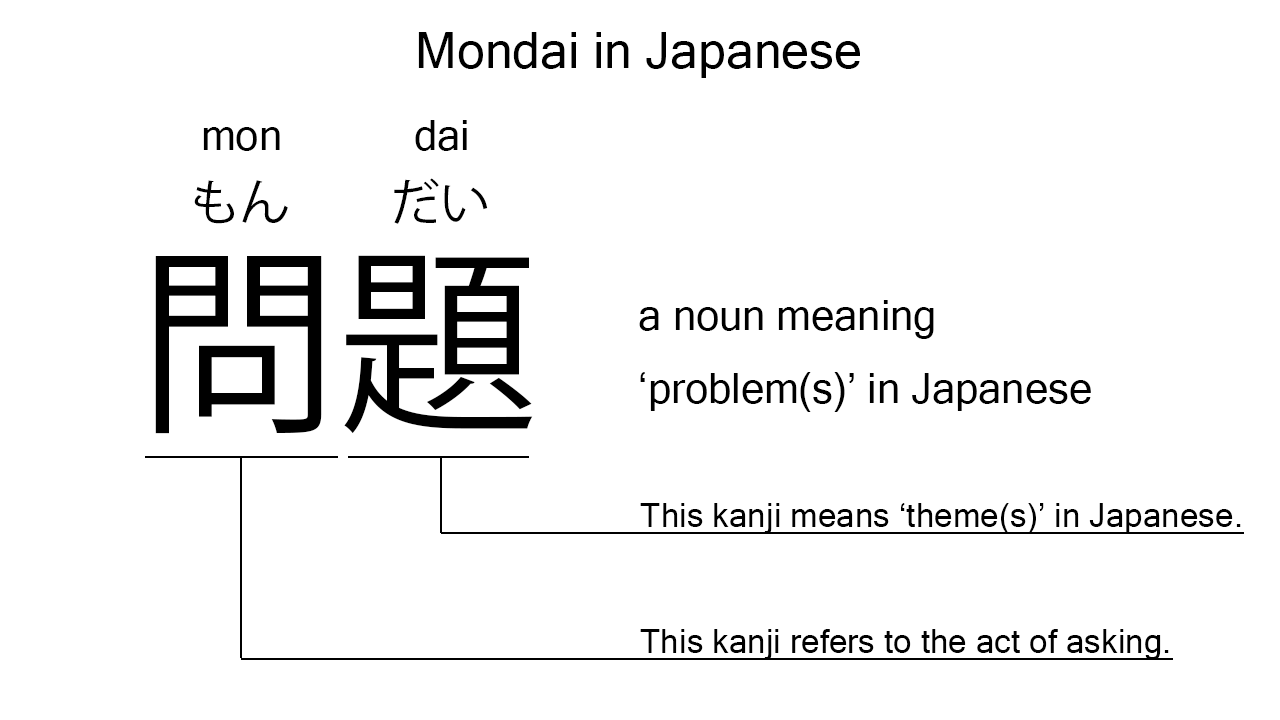What does “mondai” mean in Japanese?
Native speakers say “mondai” often to mean ‘problem’ in Japanese. Perhaps, some Japanese learners know this word as it is sometimes used in Japanese textbooks. In this blog post, however, I will explain this word in detail based on its kanji expression. And also, I will explain how to use it through example sentences. My explanations would help Japanese learners understand “mondai” more clearly. Then, let’s get started!
Contents
Definition and meanings of “mondai”
Let me start with the definition and meanings of “mondai”.
- mondai – 問題 (もんだい) : a noun meaning ‘problem’ in Japanese. Depending on the context and situation, this can also mean ‘issue’, ‘question’, ‘difficulty’, or ‘trouble’. This can also work as plural. Learn more about Japanese plural.
Native speakers use this noun often to refer to a problem or problems in Japanese. In Japanese textbooks, however, this is quite often used to mean a ‘question’ or ‘questions’. It’s worth knowing, I think.
The definition and meanings are not that difficult. To understand this noun more clearly, however, let me explain its kanji characters in detail, one by one.
What does “mondai” literally mean in Japanese?
The kanji expression of “mondai” consists of the following two kanji characters:
- 問 : a kanji character widely used to refer to the act of asking or questioning.
- 題 : a kanji character widely used to mean ‘theme’ or ‘subject’ in Japanese.
From these two kanji characters, we can understand that “mondai” literally means ‘asked themes’ in Japanese. This literal interpretation is not completely in line with the actual meanings, but still understandable, I think. Asked themes can often be interpreted as problems or questions.

When we meet new kanji expressions, we should check their kanji characters in detail to understand their meanings clearly and deeply. In many cases, kanji characters tell us a lot about the meanings of the expressions they form. Actually, here, we could get the better understanding of “mondai” through the detailed kanji check above.
So far, I’ve explained the definition and meanings of “mondai” together with its kanji characters. Then, let me explain how to use it through the example sentences below.
Example #1: how to say “do you have any problem?” in Japanese
nani ka mondai desu ka – 何か問題ですか (なにかもんだいですか)
Do you have any problem?
Below are the new words used in the example sentence.
- nani – 何 (なに) : an interrogative pronoun meaning ‘what’ in Japanese. This is often used in Japanese questions.
- ka – か : an adverbial particle used to express uncertainty. In the example, this is used after “nani” to express uncertainty.
- desu – です : an auxiliary verb used after a noun or adjective to make it polite. Probably, this is well known as a part of Japanese desu form. In the example, this is used after “mondai” to make it sound polite.
- ka – か : a sentence-ending particle used to make a question. Normally, this is used with the pitch raised. As the definition suggests, this is used at the end of the example sentence to make the question.
This is a typical usage of “mondai”. In this example, it works as a part of the commonly-used phrase, “nani ka mondai desu ka”, which politely means ‘do you have any problem?’, ‘is there any problem?’, or such in Japanese. When we want to say “problem” in Japanese, anyway, this noun is a very good option.
Example #2: another usage of “mondai”
watashi no kuruma ni mondai ga ari masu – 私の車に問題があります (わたしのくるまにもんだいがあります)
I have a problem with my car.
Below are the new words used in the example sentence.
- watashi – 私 (わたし) : a pronoun meaning ‘I’ in Japanese.
- no – の : a case particle used after a noun or pronoun to make its possessive case. In the example, this is used after “watashi” to make its possessive case, “watashi no“, which means ‘my’ in Japanese.
- kuruma – 車 (くるま) : a noun meaning ‘car’ in Japanese. This can also work as plural.
- ni – に : a case particle used to say where someone or something is. In the example, this is used after “watashi no kuruma” to say where the problem is.
- ga – が : a case particle used to make the subject word or the object word in a sentence. In the example, this is used after “mondai” to make the subject in the sentence.
- ari – あり : one conjugation of the verb, “aru”, which means ‘to be’, ‘to exist’, or ‘to present’ in Japanese. In the example, it has been conjugated for the better connection with its following word.
- masu – ます : an auxiliary verb used after a verb to make it polite. Probably, this is well known as a part of Japanese masu form. In the example, this is used after “ari” to make it sound polite.
This is another typical usage of “mondai”. In this example, it works as a part of the commonly-used phrase, “mondai ga aru”, which literally means ‘there is a problem’ in Japanese. It has been translated as “I have a problem” in this example, though.
Summary
In this blog post, I’ve explained the definition and meanings of “mondai” in detail based on its kanji expression. And also, I’ve explained how to use it through the example sentences. Let me summarize them as follows.
- mondai – 問題 (もんだい) : a noun meaning ‘problem’ in Japanese. Depending on the context and situation, this can also mean ‘issue’, ‘question’, ‘difficulty’, or ‘trouble’. This can also work as plural. These two kanji characters literally mean ‘asked themes’ in Japanese. This literal interpretation is not completely in line with the actual meanings, but still understandable, I think. Asked themes can often be interpreted as problems or questions.
Hope my explanations are understandable and helpful for Japanese learners.